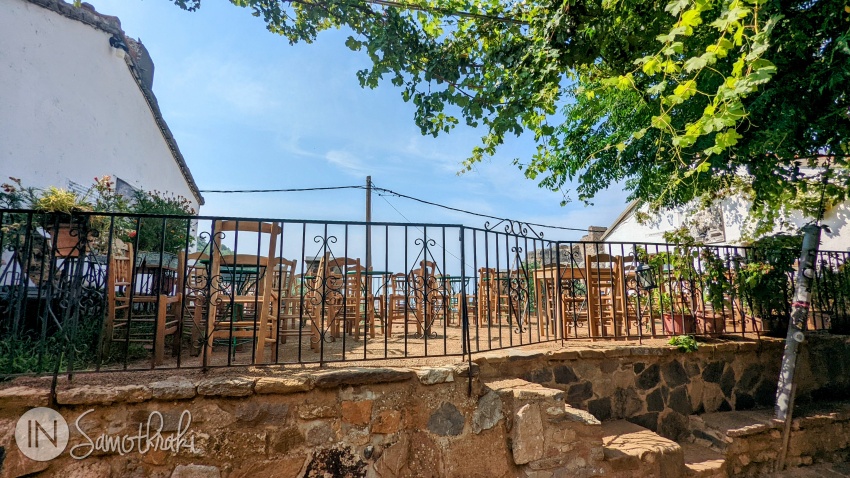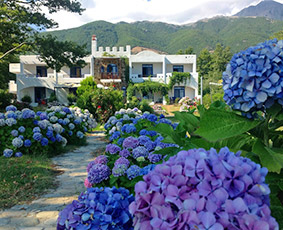As you wander through Chora in the morning, you are bound to notice a traditional stone house located on one of the narrow streets by the fortress.
A large open window, framed by a tree and colorful flower pots, serves as a counter. Bread, pretzels and other delicious pastries are carefully placed in baskets, on white lace-edged towels. You've arrived at the Antoniou family's traditional bakery.

The History of the Bakery
The bakery's history goes back to the year 1853, when Ecaterini, the great-grandmother of Eleni and Giannis had an oven there, where the inhabitants of Chora used to cook their bread. In 1922 refugees from Asia Minor moved to the island and brought an increased demand for bread, thus the oven became a proper bakery, and was taken over by Ecaterini's son, Antonis.
In 1955 it was the turn of his son, Giorgios, to inherit the bakery. He would build an additional floor that would serve as a home.
He died in 1998 and his children, Eleni and Giannis became the owners of the place and decided to keep it traditional.

A Historical Monument
As of 1998, the house that serves both as a home and a bakery is a protected historical monument.
The description from the listing of the Ministry of Culture says:
"We classify the building as a historical monument that requires special protection from the state (home and bakery) owned by Ioannis Antoniou from Chora Samothraki, as it is a typical exemple of local folk architecture, which still retains its original function (traditional bakery) and is inextricably linked to the memory of the island's inhabitants."

Bread and Other Pastries
The bread is still made in the same way as in the old times. The work starts early in the morning, before dawn. The dough is prepared from local flour (called adessa), sourdough starter and is kneaded by hand, in a big wooden trough. The round loaves of bread are then placed in the large 3-meter wide stone oven, where the fire is usually made with olive wood.
They can't make too much bread, so if you don't stop by the bakery in the morning, you may return empty-handed.

Usually, Giannis makes the bread and his sister Eleni, a teacher by profession, bakes the other pastries: sesame pretzels, cheese buns (tiropsoma), olive buns (eliopsoma), raisin buns (stafidopsoma), cheese or trahanas (a small pasta made from wheat flour kneaded with milk or yogurt) pies and peinirli (small boat-shaped bread filled with yellow cheese and olives - the smaller version of the Turkish pide).

The Rusks
A noteworthy product is the rusks, paximadi in Greek.
There's a special recipe, eptazimo, which comes from Asia Minor and in Samothraki is called gourgi. These are rusks made with a chickpea starter yeast. It takes a lot of time to prepare them, up to 33 hours, thus in the past, they were mostly eaten on holidays or were offered as gifts for engagements or births.
You can keep the rusks even for a year. If you want to prepare them, you will first have to dip them in a little water to moisten and then drizzle them with olive oil. Top them off with diced tomato, oregano and add some crumbled feta cheese (don't forget that Papanikolau factory has a very good cheese). Similarly, you can use them in salads.
And there you have it - some of the most iconic flavors of Greece in a quick and easy dish, a reminder for the senses while you are away.
How to Get to the Traditional Bakery of Samothraki?
The Antoniou Bakery is located near the fortress of Chora, just before the To Gid' Shop, on the narrow street that takes you to the town center (at the first crossroad keep walking on the street going down).
The bakery is open only in July and August, until about 1:00 PM. If you want to find a greater selection of products, my advice is to visit in the morning.
Phone: +30 255 104 1433
Right across the road from the bakery, on the roof of a traditional house, there is a tavern called I Aetsa, owned by the same family. It is one of the taverns in Samothraki that only operates for about two months a year, during the summer, and where you can try the traditional food of the island.



 What to Buy in Samothraki?
What to Buy in Samothraki?
 Fonias Pale Ale, the Beer of Samothraki
Fonias Pale Ale, the Beer of Samothraki
 Melmar Winery and "the Secret Path"
Melmar Winery and "the Secret Path"
 The Papanikolau Cheese Factory Carries on the Tradition
The Papanikolau Cheese Factory Carries on the Tradition
 To Gid' - The Goat Shop from Samothraki
To Gid' - The Goat Shop from Samothraki

Have you been there?
Tell everyone about your experience!